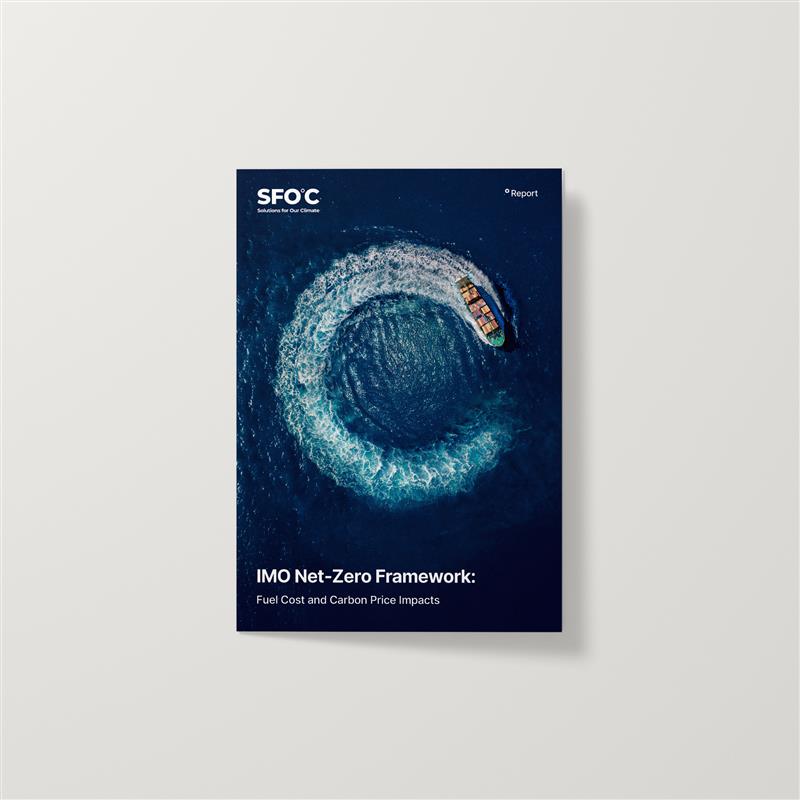
About
In 2025, the IMO approved mid-term measures that introduced a new Net-Zero Framework for international shipping, placing strong emphasis on absolute emissions reduction and carbon pricing. SFOC analyzed the economic implications of this policy shift across three scenarios, highlighting the need for targeted government intervention and a credible compensation mechanism to accelerate the early transition in the sector.
Executive summary
In April 2025, the International Maritime Organization (IMO) approved mid-term measures to reduce greenhouse gas (GHG) emissions from the shipping sector, marking a significant milestone on the path toward net-zero emissions in international shipping. Going beyond energy efficiency-focused regulations, the newly introduced "Net-Zero Framework" emphasizes total emission reductions with new price mechanisms.
This report examines the impact of the Net-Zero Framework on shipping companies’ fuel consumption, operational strategies, and cost structures, utilizing a linear programming-based cost optimization model. Incorporating a carbon pricing structure that charges between $100 and $380 per tCO₂eq based on GHG Fuel Intensity (GFI), the study compares fuel consumption, fuel costs, and carbon tax burdens across three scenarios: BAU, Base Target, and Direct Compliance Target.
The total cost trajectories diverge significantly depending on the scenario, and the key analytical findings are as follows:
Under the Non-compliance scenario, high-emitting fossil fuels incur significant carbon price burdens. However, the current pricing levels are insufficient to incentivize a shift to e-fuels.
The Base Target scenario balances carbon taxes of $100/tCO₂eq with the costs of fuel transition, representing a path that secures both policy acceptability and the effectiveness of incentives.
The Stricter Target Scenario, which complies with the Direct Compliance target, meets regulatory requirements by adopting alternative fuels early, thereby avoiding carbon tax liability. However, it imposes the highest short-term costs, highlighting the need for complementary institutional measures.
These findings suggest that relying solely on market forces may not be sufficient to achieve decarbonization in the international shipping sector. It is therefore imperative to establish a transparent pricing structure and guidelines for Surplus Units (SUs), the IMO-issued credits granted to ships that achieve the Direct Compliance Target. This will ensure adequate compensation for first movers and enhance market predictability.
Moreover, governments must prioritize building infrastructure for the production and supply of ZNZ (Zero and Near-Zero Emission) fuels, reorganizing port-centered supply chains, offering subsidies for fuel cost differences, implementing tax incentives, and integrating green financing. Using the Base Target scenario as a realistic starting point and gradually guiding the sector toward the Stricter Target represents a rational strategy that aligns industry acceptability, policy effectiveness, and actual GHG reductions.
The IMO mid-term measures are not merely regulatory—they serve as the first policy milestone toward achieving net-zero in international shipping by 2050. Current policy choices will shape the pace and cost of future transitions, and South Korea must take a proactive role in designing and implementing them.












![[Report] Achieving Net Zero in International Shipping through Korea-US-Japan Green Shipping Corridor](https://content.sfoc.tapahalab.com/images/research/s11Jime.jpg)



![[Webinar] International webinar on enhancing due diligence of forest risk commodities' supply chains in Asia](https://content.sfoc.tapahalab.com/images/research/sjGudme.jpg)

![[토론회] 한국형 녹색분류체계(K-Taxonomy), 무엇이 녹색경제활동인가](https://content.sfoc.tapahalab.com/images/research/bn8jdme.jpg)
![[Webinar] Palm Oil based Biofuels Policy and Socio-Environmental Impacts in Asia](https://content.sfoc.tapahalab.com/images/research/BOpldme.jpg)




